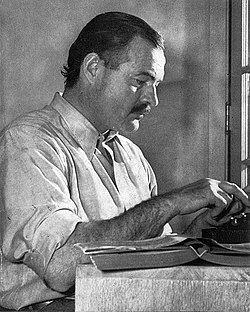Ernest Hemingway Quote
Let’s walk down the rue de Seine and look in all the galleries and in the windows of the shops.’ ‘Sure. We can walk anywhere and we can stop at some new café where we don’t know anyone and nobody knows us and have a drink.’ ‘We can have two drinks.’ ‘Then we can eat somewhere.’ ‘No. Don’t forget we have to pay the library.’ ‘We’ll come home and eat here and we’ll have a lovely meal and drink Beaune from the co-operative you can see right out of the window there with the price of the Beaune on the window. And afterwards we’ll read and then go to bed and make love.’ ‘And we’ll never love anyone else but each other.’ ‘No. Never.
Ernest Hemingway
Let’s walk down the rue de Seine and look in all the galleries and in the windows of the shops.’ ‘Sure. We can walk anywhere and we can stop at some new café where we don’t know anyone and nobody knows us and have a drink.’ ‘We can have two drinks.’ ‘Then we can eat somewhere.’ ‘No. Don’t forget we have to pay the library.’ ‘We’ll come home and eat here and we’ll have a lovely meal and drink Beaune from the co-operative you can see right out of the window there with the price of the Beaune on the window. And afterwards we’ll read and then go to bed and make love.’ ‘And we’ll never love anyone else but each other.’ ‘No. Never.
Related Quotes
About Ernest Hemingway
Ernest Miller Hemingway ( HEM-ing-way; July 21, 1899 – July 2, 1961) was an American novelist, short-story writer and journalist. Known for an economical, understated style that influenced later 20th-century writers, he has been romanticized for his adventurous lifestyle and outspoken, blunt public image. Some of his seven novels, six short-story collections and two non-fiction works have become classics of American literature, and he was awarded the 1954 Nobel Prize in Literature.
Hemingway was raised in Oak Park, Illinois, a suburb of Chicago. After high school, he spent six months as a reporter for The Kansas City Star before enlisting in the Red Cross. He served as an ambulance driver on the Italian Front in World War I and was seriously wounded by shrapnel in 1918. In 1921, Hemingway moved to Paris, where he worked as a foreign correspondent for the Toronto Star and was influenced by the modernist writers and artists of the "Lost Generation" expatriate community. His debut novel, The Sun Also Rises, was published in 1926. In 1928, Hemingway returned to the U.S., where he settled in Key West, Florida. His experiences during the war supplied material for his 1929 novel A Farewell to Arms.
In 1937, Hemingway went to Spain to cover the Spanish Civil War, which formed the basis for his 1940 novel For Whom the Bell Tolls, written in Havana, Cuba. During World War II, Hemingway was present with Allied troops as a journalist at the Normandy landings and the liberation of Paris. In 1952, his novel The Old Man and the Sea was published to considerable acclaim, and won the Pulitzer Prize for Fiction. On a 1954 trip to Africa, Hemingway was seriously injured in two successive plane crashes, leaving him in pain and ill health for much of the rest of his life. He committed suicide at his house in Ketchum, Idaho, in 1961.
Hemingway was raised in Oak Park, Illinois, a suburb of Chicago. After high school, he spent six months as a reporter for The Kansas City Star before enlisting in the Red Cross. He served as an ambulance driver on the Italian Front in World War I and was seriously wounded by shrapnel in 1918. In 1921, Hemingway moved to Paris, where he worked as a foreign correspondent for the Toronto Star and was influenced by the modernist writers and artists of the "Lost Generation" expatriate community. His debut novel, The Sun Also Rises, was published in 1926. In 1928, Hemingway returned to the U.S., where he settled in Key West, Florida. His experiences during the war supplied material for his 1929 novel A Farewell to Arms.
In 1937, Hemingway went to Spain to cover the Spanish Civil War, which formed the basis for his 1940 novel For Whom the Bell Tolls, written in Havana, Cuba. During World War II, Hemingway was present with Allied troops as a journalist at the Normandy landings and the liberation of Paris. In 1952, his novel The Old Man and the Sea was published to considerable acclaim, and won the Pulitzer Prize for Fiction. On a 1954 trip to Africa, Hemingway was seriously injured in two successive plane crashes, leaving him in pain and ill health for much of the rest of his life. He committed suicide at his house in Ketchum, Idaho, in 1961.
